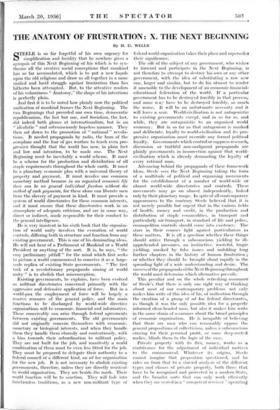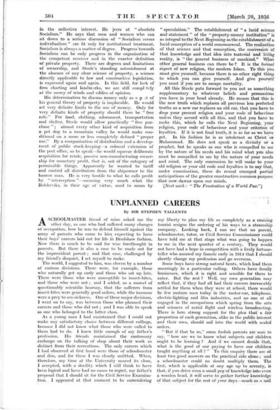THE ANATOMY OF FRUSTRATION : X THE NEXT BEGINNING
By H. G. WELLS
STEELE is so far forgetful of his own urgency for simplification and lucidity that he nowhere gives a synopsis of this Next Beginning of. his .Which is to syn- thesise all the creative social conceptions that mankind Ilia so lir accumulated, which is to put a new façade upon the old religions and draw us all together in a more unified and lucid struggle against frustration than has hitherto been attempted. But, to the attentive readers of his vOluminOus " Anatomy," the shape of his intentiona is perfectly plain.
And first it is to be noted how plainly now the political unification of mankind frames the Next Beginning. The two BeginningS that preCeded our own time, democratic republicanism, the last but one, and Socialism, the last, did indeed both glance at internationalism, but in an "idealistic " and subtonsciouslyhopeles. s- manner. They then sat- down to the promotion of " national " revolu- tiOns: It needed propaganda by radio, the hum of the aeroplane and the fear of gaS warfare to teach even pro= greSsive thought that the world has .now, in" plain fact and law and intention, to be made one. The Next Beginning must be inevitably a world scheme. It must be a scheme for the production and distribution of all staple requirements throughout the whole earth. It must be a planetary economic plan with a universal theory of property and payment. It must involve one common monetary method because in an organised economic life there can be no general individual freedom without the method of cash payments, for these alone can liberate men from the slavery of payment in kind. It must provide a system of world directorates for these common interests, and it must ensure that -these directorates work in an atmosphere of adequate criticism, and are in some way, direct or indirect, made responsible for their conduct to the general intelligence.
Ile is very insistent in his sixth book that the organisa- tion at world unity involves the evocation of world coritiols, differing both in structure and function from any existing government: This is one of his dominating ideas. lie will not hear of a Parliament Of Mankind or a 'World President Or anything of the sort. It is, he says, " the easy preliminary pitfall " for the mind which first seeks to piettire 'a world commonweal to Conceive it as a large- scale replica of existing State governments. " The first task of a revolutionary propaganda aiming at world unity "- is to abolish that misconception.
Existing governments, he explains, have been evolved as militant' directorates concerned primarily with the aggressive and defensive appliCation Of force. But in a world-pax -.the employment- of force will be largely a reserve' resource of the general police, and the main functions to be discharged by world-wide directive organisations will be economic, financial and informative. These conceivably can arise through federal agreements between existing governments. The old governments did ,not originally concern themselves with economic, monetary or biological interests, and when they handle them they handle them clumsily and contentiously, with a bias towards their subordination to militant policy. They are not built for the job, and manifestly a world combination of them must be even less fitted for the job. They must be .prepared to delegate their authority to a federal council of a different kind, an ad hoc organisation for the new job. It is not necessary to abolish existing governmentS, therefore, unless they are directly resistent to world organisation.. They are beside the mark. Their world function 'will be to sanction. They will fade into functionless traditions, as a new non-militant type of federal world-organisation takes their place and supersedes their significance.
The role Of the subject of any government, who wishes to forward and participate in the Next Beginning, is not therefore to attempt to destroy his own or any other government, with the idea of substituting a raw new one, larger and similar, but to do his utmost to render it amenable to the development of an economic-financial- educational federation of the world. If a particular government has to be destroyed forcibly in that process, and some iray have to be destroyed forcibly, so much the worse. It will be an unfortunate necessity and it will leave a scar. World-civilisation is not antagonistic to existing governments except, and in so far as, and while, they are antagonistic to an organised world economy. But in so far as that antagonism is marked and deliberate,' loyalty to world-civilisation and its pro- gressive organisation must override any formal political loyalty. Governments which control or suppress research, discussion or truthful non-malignant propaganda are plainly governments in insurrection against that world- civilisation which is already demanding the loyalty of every rational man.
Advancing behind the Propaganda of these framework ideas, Steele sees the Next Beginning taking the form of a multitude of political and organising movements for the establishment of a number of world-wide or almost world-wide directorates and controls. These movements may go on almost independently, linked only by their planetary range. In spite of all contemporary appearances to the contrary Steele believed that it is not merely possible but urgent that in the various fields of health, money and credit, in the production and distribution of staple commodities, in transport and particularly air-transport, in standard of life and police, cosmopolitan controls should come into existence. The stars in their courses tight against particularism in these matters. It is all a question whether these things should arrive through a subconscious yielding to ill- apprehended pressures, an instinctive,- wasteful, tragic yielding, masked by false issues and unfolding long further chapters in the history of human frustration ; or whether they should be brought. about rapidly in the spreading light of a wide understanding and desire. The success of the propaganda of the Next Beginning throughout the world must determine which alternative prevails.
This peculiar and on the whole refreshing assurance of Steele's that there is only one right way of thinking about most of our contemporary problems not only makes him write of 'this idea of his, of unification through the creation of a group of ad hoc federal directorates, as though it was the only possible idea for a' properly informed clear-headed man, but also it makes him write in the same strain of assurance about the broad principles of economic organisation. lie is incapable of believing that there arc men who can reasonably oppose the general propositions of collectivism, unless a subconscious craving for their personal profit, or sonic deep-rooted malice, blinds them to the logic of the ease.
Private property with its flux, money, works as a contrivance for the adjustment of individual motives to the commonweal. Whatever its origins, Steele cannot imagine that proposition questioned, and he rides on from that to a shrewd analysis of the different types and classes of private property, both those that have to be recognised and protected in a modern State, and the broader sorts that can only work efficiently when they arc vested in a " competent receiver " operating in the collective interest. He jeers at " absolute Socialism." He says that men and women who can sit down to a serious discussion of " Socialism versus individualism " are fit only for institutional treatment. Socialism is always a matter of degree. Progress. towards Socialism can be only progress in the organisation of the competent receiver and in the exacter definition of private property. There are degrees and limitations of ownership, and Steele's standing astonishment at the absence of any clear science of property, a science directly applicable to law and constructive legislation, is expressed again and again. In this field, for lack of firm charting and landm irks, we are still compl Aely at the mercy of winds and eddies of opinion.
His determination to discuss money only as a p et of his general theory of property is implacable. He would set very definite limits to the use of money. Only for very definite kinds of property should there be " free sale." For food, clothing, adornment, transportation and shelter, Steele would allow practically " free pur- chase " ; almost every other kind of acquisition from a pet dog to a mountain valley he would make con- ditional on a more or loss completely defined " proper use." By a reorganisation of distribution and a develop- ment of public stock-keeping—a colossal extension of the post office, so to speak—he would squeeze deliberate acquisition for resale, passive non-manufacturing owner- ship for monetary profit, that is, out of the category of permissible things. • Apparently • he wanted to tariff and control all distributors from the shipowner to the barrow man. He is very hostile to what he calls profit by " interception "—meaning very much . what. the Bolsheviks, in their age of virtue, used to mean by " speculation." The establishment of " a lucid science and statement of the "property-money institution" is as integral to the Nekt Beginning as the establishment of a lucid conception of a world commonweal. The realisation of that science and that conception, the conversion of that knowledge and that idea into material reality, is " the general business of mankind." ‘Vhat other- general business can there be ? It is the formal aspect of new religion, the modern Islam. TO thiS you Must give yourself, because there is no other right thing to which you can give yourself. And give yourself you must if you are to escape mortality.
All this Steele puts forward to you 'not 'as 'something supplementary to whatever beliefs and persuasions you have in your head already. He means that this is the new truth which replaces all previous less perfe6ted truths as a new car replaces an old car, that you 'haVe to drop your present religion and your code of behaviour unless they accord with all this, and that you haVe to make this,, which he calls the Next Beginning, your religion, your code of behaviour and your criterion of loyalties. If it is not final truth, it is as far as •we hate got. In his fashion he is as intolerant as Christ or Muhammad. He does not speak as a ditinitY or a prophet, but he speaks as one who is compelled to see by the nature Of his needs and his mind what yon slso must be compelled to see by the nature of your needs and mind. The only concession he will make to ybui old religion or your old code and loyalties is to say that, under examination, these do reveal cramped partial anticipations of the greater constructive common purpose .that' now dawns- upon our minds.
[Next week : " The Frustration of a World Paz."J



































































 Previous page
Previous page